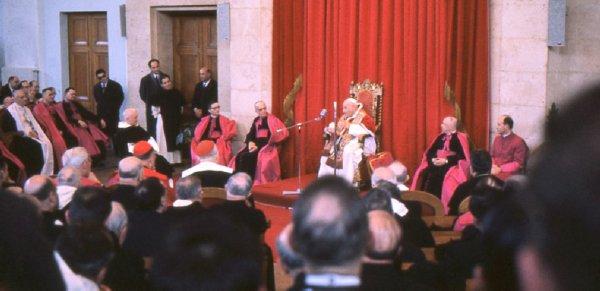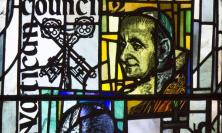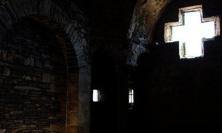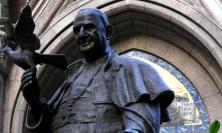Celebrations for the canonisation of Pope John XXIII on 27 April 2014 will be especially spirited in the home of Elizabeth Paulhus, where the ‘Good Pope’ has been thought of as a saint for many years. She tells Thinking Faith about the influence that John XXIII has had on the life of her family.
‘John XXIII loved polenta.’ My mother was in grade school when she heard this. Being of Northern Italian descent, she took great pride in sharing this love with the pope. This phrase was the first to come to mind when I received the request to write something about the Good Pope in honour of his canonisation on 27 April. My initial reaction was one of excitement. After all, my family had treated John XXIII as a saint for as long as I could remember. A papal blessing from John XXIII for my grandparents’ 25th wedding anniversary hangs in my parents’ house. For Christmas a few years ago, I gave my father several vintage Time and Life magazines about John XXIII. When my father speaks of the Good Pope, his nose twitches, which indicates pride. And of course, there was that mutual love of polenta, which endeared this particular pope to our family all the more!
The initial enthusiasm quickly turned to doubt. What could I, a thirtysomething Catholic policy wonk and erstwhile theology student, contribute to the discussions about John XXIII? Historians and biographers have dissected every aspect of his life, from his childhood in a sharecropping family, through his time as a military chaplain and his work in Turkey and Bulgaria, to his decision to convene the Second Vatican Council. Theologians have written extensively about his encyclicals and his ecclesiology. Countless individuals have reflected on the parallels between John XXIII and Francis. What did this leave me?
I had made up my mind that I had nothing to contribute to the conversation and that I would decline the article request. And then I went to Easter Mass in my grandmother’s parish in Massachusetts. You know how 1 Kings says that God was in the gentle whisper or ‘sound of fine silence’? This felt more like the mighty wind or earthquake that preceded that whisper. Not only did my grandmother’s church have a stained glass window of John XXIII, but the priest devoted the majority of his Easter homily to the pope’s life and influence. All that was missing was the giant neon sign saying, ‘Liz, write the article.’
After some consideration, I decided that I would tell how John XXIII influenced my father’s life and, in turn, my own. This story is by nature incomplete, but I thought I would presume to share pieces of it. The snippets from my father come from a conversation that we had on Easter Sunday 2014.
-------
When John XXIII was elected in 1958, my father was an Assumptionist seminarian studying theology in France. He said that when his religious community learned that Cardinal Roncalli had been elected pope, the initial reaction was one shared by many: ‘Who?’ It seemed like the conclave had chosen someone who would be little more than a placeholder for a few years until they could elect a real pope. This impression faded quickly when John XXIII announced in the first few months of his papacy that he would be convening a Council.
As we talked about John’s papacy, I asked my father to recount the moment when he felt that real change had come. By this time, he was a student at the Angelicum in Rome.
It was the second or third day of the Council. Reporters from La Croix [the French daily newspaper published by the Assumptionists] came rushing into our residence hall full of excitement and running to phones. We knew something dramatic had happened. We soon found out that the Curia had prepared what they call schemata, which were outlines for the Council: how the Council would proceed, who would sit on commissions, what they would do, and so forth. The Curia officials who had been charged with preparing the Council proposed the schemata to the general membership, which they assumed would be accepted with little opposition. Instead, a pretty significant number of European cardinals and bishops convinced enough people to reject the proposed schemata. New agendas would be created by commission members chosen by the Council at large. For me, that was the beginning of real hope that this was not going to be just a rubber stamp Council.
These Council members had taken to heart John’s call to bring the Church into the 20th century (aggiornamento). What I find fascinating is that John XXIII did not simply say to his cardinals and bishops, ‘This is how it is going to be.’ My father reminded me that this view of decision-making reflected John’s understanding of Church.
He had a very keen sense of collegiality, a very keen sense of the Church as the people of God. This theme can be seen in his thinking before the Council was called. In Pacem in Terris, he began to talk about the Church as the people of God, the Church as a universal people, the Church as having a mission to the world. Implicitly it suggested a ‘new’ theology of the Church that flowed from the early Church’s understanding that we are the people of God and that we are servants.
Although my father did not have any private audiences with the pope, he was fortunate enough to have seen him several times. He had a chance to witness John’s travels to a meeting with government officials outside of Vatican City, the first time in more than a century that a pope had set foot outside of the Papal States (photograph below).
He also was present when John XXIII received the prestigious Balzan Prize for peace. In addition, as part of his visits to seminaries and schools of theology in Rome, John XXIII came to the Angelicum where my father was studying.
He sat with us seminarians in this small auditorium that seated 200 people at the most. He just sat and chatted jovially with everybody. He was very unpretentious and very open-minded. His experiences [in Bulgaria and Turkey] had given him a broad understanding of the world. They shaped his openness to change.
Dad also told me about attending John XXIII’s funeral in 1963 (photograph below).
There was a lot of sadness, obviously, and millions of people came to the Square to pay their respects. The funeral was pretty restricted, because so many bishops had come from all over the world, as well as dignitaries from many nations. One of the boxes near the altar was reserved for journalists, and I managed to find a pass as a Dutch journalist and was able to enter into the basilica and attend the funeral.
When I pushed my father to say how he happened upon a Dutch press pass, his matter-of-fact response made me chuckle. I think this might have been one of those ‘spirit of the law’ moments that he has always been fond of promoting.
The Dutch Assumptionists had a local newspaper, and they were able to get a few invitations. Not all of them could come, so they had some extra passes. So I became a Dutch journalist for the day! I just used my German and pretended it was Dutch.
Even though he died before the completion of the Council, John’s influence was visible in all of its documents, whether on ecumenism, liturgy, the nature of the Church, or the Church in the modern world. But most important for my story was the impact that John XXIII and the Council had on my father.
In terms of my personal life, he had a tremendous influence, because it is largely his emphasis on the role of conscience and personal responsibility and understanding your role as a layperson, understanding your role as a theologian, that led me to realise that my real vocation was teaching.
There were whiffs of change in the air, and I think what we were catching as seminarians, not so much in our formal teaching, but through the atmosphere in Rome, was all this turmoil and upheaval and all these new thoughts that were being tossed around.
I think what the years after the Council did to persons like me who were serving as priests in the community was to show us the flaws in the old system. It led to, in my case, realising very quickly that ethical issues, especially in social ethics, were coming to the fore and had become central in moral debates. It led me to recognise that we needed a different kind of pastoral approach when talking to this generation of radically liberated adolescents. Contact with laypersons also forced me to see how the whole world was shifting so rapidly that we needed to pay attention to the signs of the time.
------
As you have probably gathered by now, my father eventually decided to follow his conscience and leave the priesthood in order to serve the Church through teaching and through family life. Growing up with a moral theologian father who had lived through the heart of the reform and had been influenced greatly by John XXIII certainly impacted my life. From the time I was small, theological conversations were as commonplace in the Paulhus household as those about baseball or politics. Being open to the world and to change went without saying, and reading the signs of the time was more than simply a phrase. Following one’s conscience was more important than obeying ‘authority,’ which sometimes got me into trouble. My pursuit of theology and then public policy had its roots in theological breakfast conversations with my dad, in growing up in a house where John XXIII was a saint long before his official canonisation. I guess I can thank the Good Pope for my reformist tendencies. Or maybe it was just the polenta…
Elizabeth Paulhus is the Northern Regional Director for Catholic Charities West Virginia.
(All photographs: Dr Norm Paulhus)






